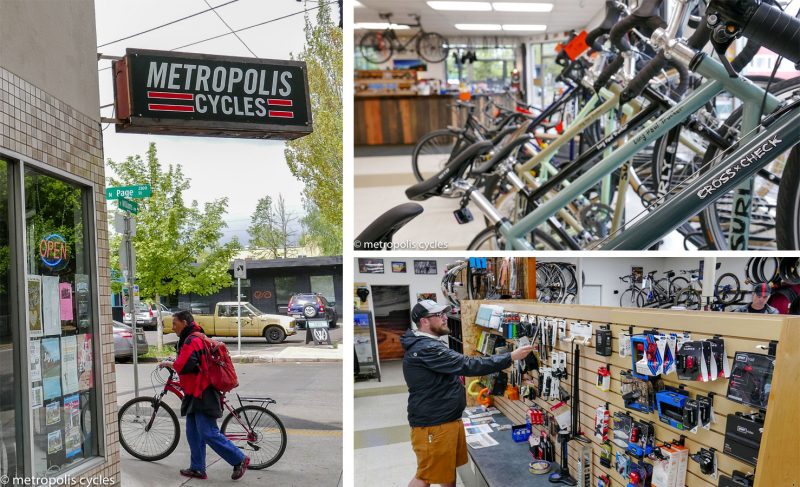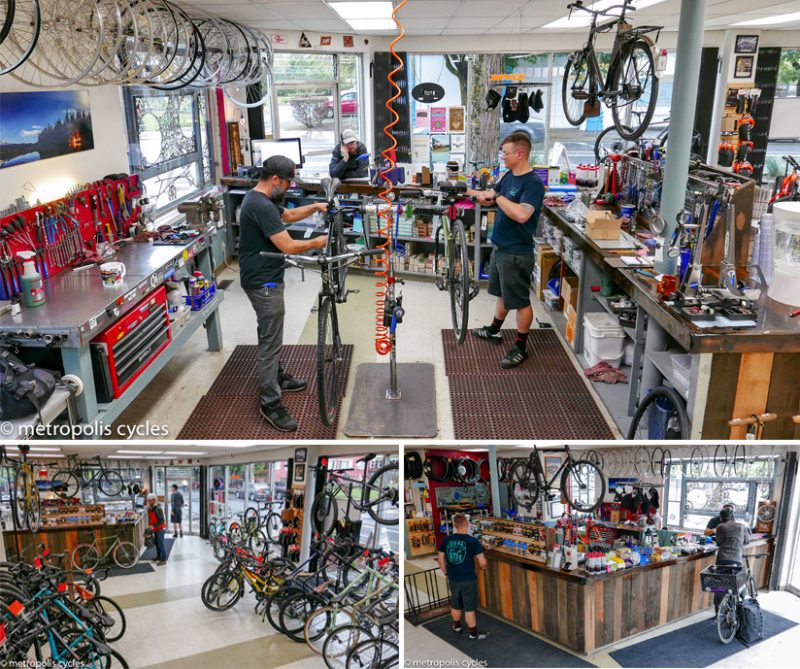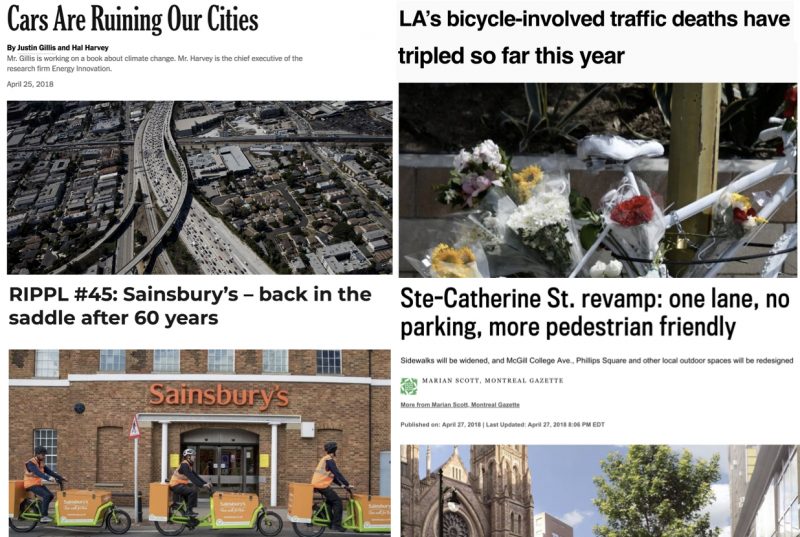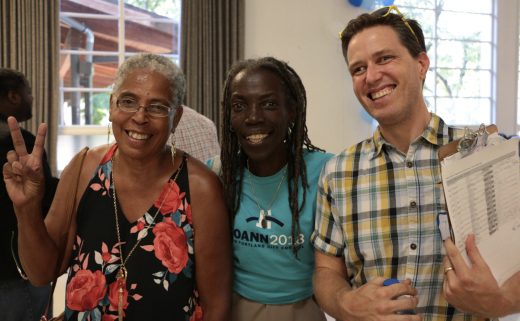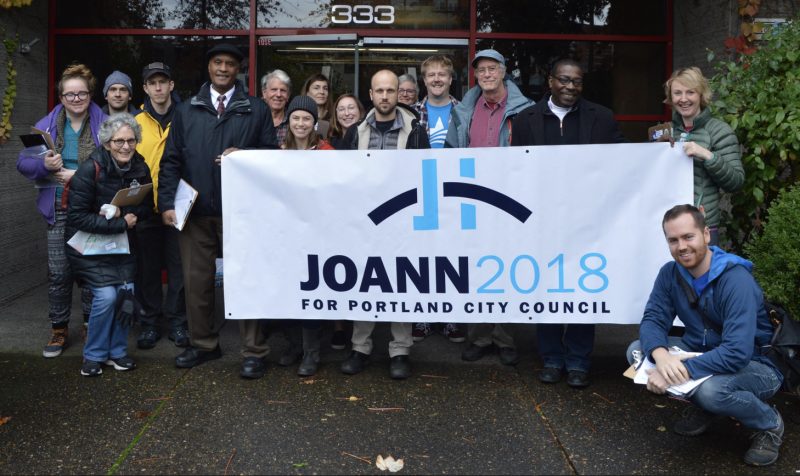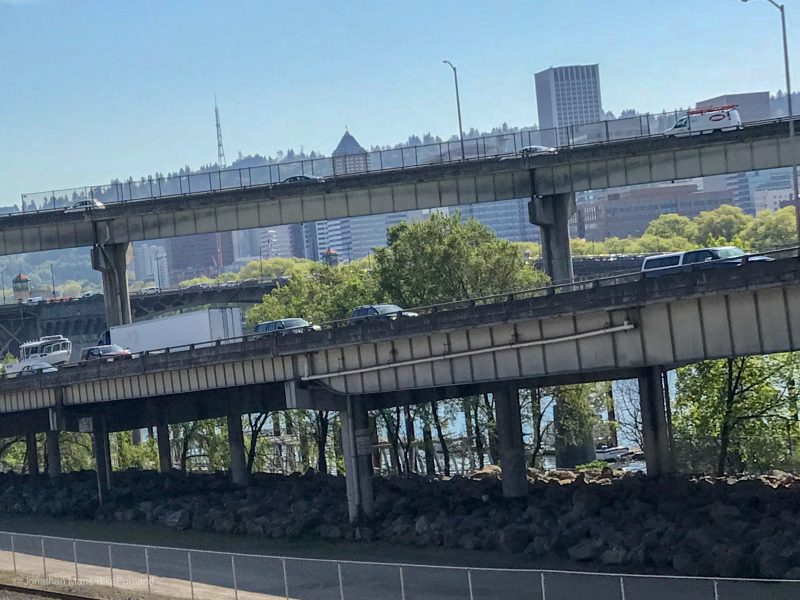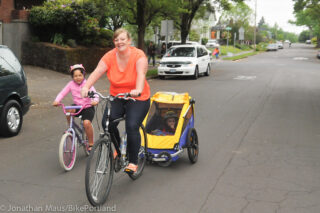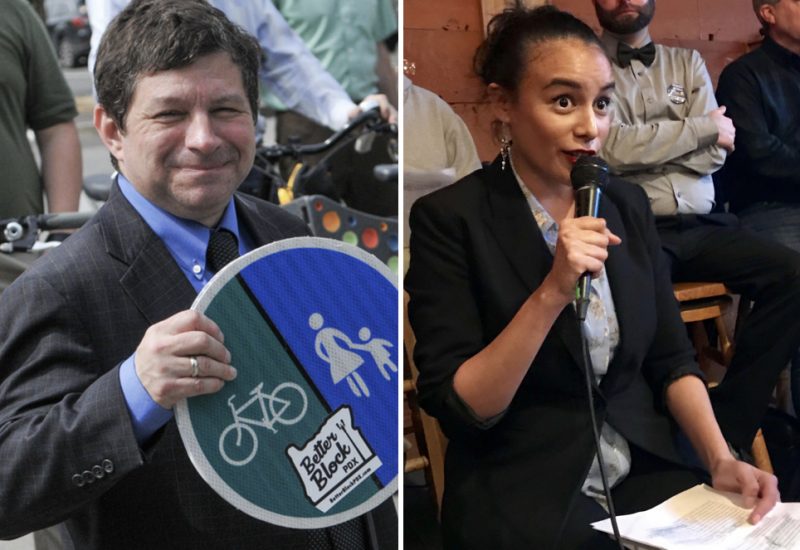
Former Commissioner Steve Novick at a 2016 event and Andrea Valderrama at a candidate forum earlier this month.
(Photos: Jonathan Maus)
Steve Novick was a Portland City Commissioner from 2013 to 2017.
After having the pleasure of having her serve on my staff for four years as city commissioner, today I’m writing to the readers of BikePortland.org to officially announce and explain my endorsement for Andrea Valderrama for Portland’s City Council race. Quite simply, my experience of working with her has left me convinced that she’s the candidate you should vote for if you’re interested in demonstrable improvements to the safety and livability of our streets, our region’s ongoing housing crisis, and how these issues relate to climate change, public health and equity.
It’s evident this is a candidate who has spent time in the trenches, can speak the alphabet soup of acronyms and jargon among the best of them, and understands not only the imperative to reconfigure our streets for better outcomes, but also the mechanisms and to do so.
My endorsement of Andrea isn’t merely an exercise in championing Andrea’s accomplishments, achievements and integrity (although I will do so shortly), but is explicitly predicated on my experience as a former Portland City Commissioner, one who was responsible for the Portland Bureau of Transportation throughout my term. Having sat behind the dais, it’s clear to me that Andrea’s skillset uniquely matches both the requirements of the job and the specific challenges Portland faces.
Overseeing PBOT put me and my staff on the immediate frontlines in regards to the daily nuances of bike lanes, snow plows, and myriad of interagency compromises that define the daily workings of a 750-employee organization with a $310 million annual budget, responsible for $8.4 billion worth of infrastructure. As I wrote in Willamette Week last year, Portland’s unique Commissioner form of governance creates some perverse and counterintuitive incentives for politicians and bureaus that stymie genuinely thoughtful attempts to improve municipal services. I learned all of this firsthand, and I suspect many of you reading this blog followed along, as PBOT fought for more funding to address thirty years of deferred road maintenance, stronger policy initiatives for safe routes to school, and investments in sidewalks in East Portland. I’m proud of our accomplishments (which include launching BIKEtown, passing the gas tax and a Vision Zero resolution) but traffic fatalities continue to rise, congestion is getting worse, and we still have plenty of potholes to fill.
Each Commissioner is directly accountable to specific public, private and nonprofit sector constituents related to their bureau. The art of “getting to three votes” frequently involves complicated negotiations, particularly if you want to stand up for historically disenfranchised groups like tenants, transit riders, and/or East Portlanders. What I see as the structural, cultural and budgetary limitations to improving Portland’s transportation system color my understanding of the sort of leader the city needs. They need to embody a competent, policy-fluent, justice-minded, results-driven leadership that is necessary to not only govern despite these onerous realities but build support for efforts for reform. It’s easy enough to serve platitudes and bromides about the extent to which a candidate would be a “champion” for housing affordability, police accountability, equality and justice —the reality is, it’s harder to demonstrably live that leadership, as it pertains to the combination of nuance, wisdom, and guts necessary to win those three votes.

Fortunately, anyone that’s worked with Andrea can tell you — she’s lived it. If you read her responses to the question posed at last month’s transportation forum, it’s evident this is a candidate who has spent time in the trenches of these conversations, can speak the alphabet soup of acronyms and jargon among the best of them, and understands not only the imperative to reconfigure our streets for better outcomes, but also the mechanisms and to do so.
Andrea has time and again proven herself more than capable at navigating bureaucracies, community advocates, and policy.
Andrea was a significant proponent of the improved sidewalks and crosswalks on 122nd, a crucial element of the Fix Our Streets program resulting in frequent bus service on the major East Portland arterial. This sort of governing work is unsexy, arduous, and rarely appreciated. Andrea proved to be incredibly effective when it came to being able to speak wonky code with TriMet bureaucrats, listen empathetically to diverse community voices, collaborate with PBOT to prioritize projects to fund with new revenue, and advocate for political time and capital be invested in justice-minded, cost-efficient outcomes. Her continued collaborative work with the East Portland Action Plan, TriMet, and PBOT helps ensure that the gas tax would fund the necessary infrastructure providing East Portland the first frequent-service north/south bus line in decades.
Andrea’s policy acumen is similarly on display in the successes of the Foster Streetscape Project [which will start construction this summer]. Her leadership led to a bureau-wide realignment for how community engagement work is conducted. Despite strident opposition, the end result is one for which the city should be proud. Upon completion, the City of Portland will build a major safety investment in a High Crash Corridor that has seen numerous fatalities. Small businesses will enjoy a more walkable environment to entice shoppers. Southeast Portlanders will have increased transportation options. Win-win-win.
These examples of Andrea’s leadership, thoughtfulness and project management are recognized by community advocates that have had the pleasure of working with her. She’s been a dedicated voice for change at the David Douglas School District, where she serves as a Board Member; it’s not exactly an easy lift to get a unanimous vote for birth control funding from an East Portland school board, but she pulled it off. She’s likewise received accolades from her work in the Mayor’s office on the Sanctuary City resolution. Andrea has time and again proven herself more than capable at navigating bureaucracies, community advocates, and policy. That she’s built this illustrious list of accomplishments while co-parenting her beautiful, spunky daughter speaks volumes to her tenacity, commitment to values, and inherent humanity.
A city commissioner by herself can’t promise to immediately implement a permanent Better Naito, all of PBOT’s proposed Enhanced Transit Corridors, fight ODOT’s senseless freeway expansion, or raise taxes on the wealthy to fund Youthpass. That level of Sin City-esque dictatorship is simply not within the job description (again, the whole thing about getting to three votes). But a city commissioner can govern in such a manner that the advocates, rabble rousers, and community members desperately clamoring for full-fledged solutions to our housing, transportation, and police accountability issues are given full administrative attention and support. That takes a different type of leadership — one that I’m confident Andrea will deliver.
— Steve Novick
Publisher’s note:
Valderrama is running for City Council position number three. Learn more about all the candidates here. For more coverage don’t miss our recap of the recent candidate forum on transportation. For another look at this race, read the Willamette Week’s endorsement of Valderrama’s competitor Jo Ann Hardesty.
If anyone else has endorsements they’d like to publish, drop a line and we’ll consider it.
– Jonathan Maus
Never miss a story. Sign-up for the daily BP Headlines email.
BikePortland needs your support.
The post Guest Opinion: I’m Steve Novick and I endorse Andrea Valderrama for Portland City Council appeared first on BikePortland.org.
from BikePortland.org https://ift.tt/2HxoMGk

